Instructions for Love Read online
INSTRUCTIONS FOR LOVE
By
June Shaw
Copyright © 2012 by June Shaw
All rights reserved.
This novel is a work of fiction. Names, characters, places and incidents are either the product of the author’s imagination, or, if real, used fictitiously.
No part of this book may be reproduced or transmitted in any form or by an electronic or mechanical means, including photocopying, recording or by any information storage and retrieval system, without the express written permission of the publisher, except where permitted by law.
Chapter One
Erin Westlake stared at the still-open tomb. The sweet scent of red-speckled lilies set in front of the casket mingled with the smell of damp earth. “Amen,” she repeated with the priest and the crowd.
The stifling humidity helped make the entire scene surreal. Her loveable Aunt Tilly, the closest person to making Erin’s world stable, was dead. Erin rushed down here and found Louisiana’s southern end flat and its occupants’ accents swelling around her almost as heavy as their air. Their graveyard appeared alive with moss whiskers swaying from huge oaks. Ornate tombs stood along grassy paths like small white houses.
Aunt Tilly always did the unthinkable. Now she’d left Erin to remain in this death-filled village in the steamy town of Rainbow Bayou.
People began moving away from the tomb.
“You have my sympathy. Tilly was a special lady,” mourners said, squeezing Erin in a hug as though they had known her all her life. She fought back more hot tears.
While the crowd dispersed, she spotted a broad-shouldered man. She noticed him especially because he was tall and held yellow roses. People had sent sprays and baskets to the church. He carried his flowers. And instead of bringing them to her aunt’s tomb, he walked away with them. He stopped at a nearby tomb, gazed at it, and arranged the flowers in a vase.
A squat woman with an enormous grin scooted up to Erin. Her thick gray hair was pulled into a ponytail. “You’re Erin?” she asked, nodding like she already knew the answer.
“I am.”
“Here.” She yanked a white silk dove out of the arrangement of lilies on the casket and shoved its wire stem into Erin’s hand. “And Tilly sent you this.” She gave Erin a large manila envelope.
Chills skittered down Erin’s arms. She looked up to ask questions. The woman was scrambling away faster than seemed possible on her short legs. “Wait!” Erin called.
The woman glanced back with a smile. She waved goodbye to the man Erin had noticed, hopped up into a late-model red truck, and drove away.
Erin stood alone. Tightening her grip on the envelope, she imagined what her adored aunt had left for her. Personal papers?
With quivering hands, she opened the package.
A binder clip held a few loose-leaf pages. Tilly had used blue ink. Her unmistakable swirls made a few words flow on the first sheet.
My sweet Erin, please don’t be sad. Illness has taken me home, where I am now certainly happily reunited with my dear husband Cliff.
Erin wiped the tears searing her eyes. She swallowed, unsuccessful in stopping the burn in her throat.
My main hope is that one day you will discover such a loving partner of your own.
I have one other wish, my dearest, and if you’ll do it for me, you will be adding to my eternal bliss.
Of course Erin would do it, whatever it was. She adored her Aunt Tilly and would do anything for her.
Erin skimmed other words on the page, shaking her head. She stared at the tomb draped with lilies. “Oh, Aunt Tilly, what have you done now?”
Dane Cancienne had just changed into jeans when someone pounded on his back door. Most of the men who worked in his cane fields just rang the doorbell. By the rattling noise, he knew this person banged against the old screen door’s wooden frame.
“Yes?” he said, yanking the entrance door open.
She stood on the top step. This woman he had seen at the graveyard may have been in her late twenties, a few years younger than he was. The sun’s falling rays glinted through the live oak beyond her and dappled gold into her beignet-brown hair. Her eyes turned up—to his chest, not his face. “Oh, you’re not dressed.”
“Sorry,” he said, realizing he hadn’t buttoned his denim shirt yet.
She gazed aside while his fingers closed all of the buttons.
He stared at her. No wonder he’d noticed her legs at the graveyard. Her black dress looked short, although it stopped not high above her knees. Her heels seemed higher than those worn by most women around here. He couldn’t tell about the rest of her with that loose black jacket covering so much of her body. The early August weather was much too hot for a jacket like that. But she probably hadn’t known. She was one of Tilly’s relatives from up north, surely coming for the key to the cottage to collect Tilly’s things.
“Now,” he said. “I’m all dressed.”
“Good.” She peered up at him. Her eye contact made his stomach muscles contract.
Dane gave his head an angry shake. Why did he care if an attractive woman faced him directly? That happened all the time since his wife Anna died.
Red streaks near the mossy gray of her eyes reminded him of why she had bothered him so much at the graveyard. The misery she’d shown made him recall Anna’s death and his crying for her. He had felt so wretched, he decided then that he would never again shed another tear.
He would give this woman Tilly’s key and have her go. “Can I help you?” he asked.
“I don’t know.” She glanced back at the lawn, at the long winding driveway from the highway, at the trees. She looked at him. “Tilly was my father’s sister.” At least she said these words with certainty.
“Tilly was a good woman.”
“She was.” Dampness ridged the bottom of his visitor’s eyes.
Dane willed up anger to force away the tightness gripping his chest. He’d like to tell her nice things about Tilly—she had smiled often, done a great job of cleaning his house and making top-notch gumbo—but he didn’t feel like talking right now.
“I’m from New York,” she said, telling more than he wanted to know. “And Aunt Tilly wanted me to stay in her house.”
This information confused Dane. But then he hadn’t known lots about Tilly, except she seemed to adore her husband. She had shown up last year, married Cliff, a terrific worker in the cane field, and moved with him into one of the cottages out back. An aneurysm took Cliff suddenly and soon afterward Tilly asked Dane if she could work in his house, help keep it clean and do some cooking. That arrangement worked fine. The house was too large for the part-time lady to keep straight. But then Tilly took sick. She didn’t last long. Didn’t want tears. For that, he’d been grateful.
Now Tilly’s request baffled him. Maybe her niece didn’t have a place of her own? She looked dressed well enough, but what did he know? He knew he could let her get into that cottage. “I have Tilly’s keys.”
Without invitation, the northern nudged up through the door. Even more surprising, she carried a small suitcase.
“What a large unique house,” she said, eyeing the high ceilings. She looked at the cucumbers, okra, and eggplant still in boxes on the floor of the back room and the anvil doorstop inside the kitchen. “Oh, I’m sorry. I’ve been so upset since Aunt Tilly died. I forgot to introduce myself. I’m Erin Westlake.” She held out a small hand that hadn’t seen much hard work.
Dane clasped it. The warmth rushing through him made him let go of her hand. “Dane Cancienne,” he said, stepping away across the kitchen. Tilly’s keys hung beside his on a key ring with her dangling butterfly trinket.
“I had no idea Aunt Tilly owned a whole plantation,�
� Erin said.
“She owned it?” Dane determined the stranger was distressed. He would give her time to collect herself and her thoughts.
Erin shrugged and dropped onto a chair at the table. She turned her head, glancing around the room. She’d set her purse on the table and her luggage on the floor.
At least the piece looked light, as though she’d only planned to come down for a funeral. Then maybe a night at the hotel in town before she went home. He’d carry that suitcase out for her once he explained about Tilly’s place being out back. He’d drive his truck ahead of that compact car she must have rented from the airport in New Orleans and show her which cottage was her aunt’s.
“This house carries a scent of antiquity,” she said, “almost like it’s known many happy family members.” Erin looked sadder. “As if I’d know about that.”
Dane went for Tilly’s key ring.
“But such a puzzling request.” Erin said pulled a manila envelope out of her purse. “I was supposed to hurry back to work. But Aunt Tilly wanted me to stay here.”
“When did she ask you to do that?” Dane asked.
“Just now.”
“After we buried her?” This woman was too confusing.
“It almost seems like a mystery—although I didn’t know Aunt Tilly to especially like mysteries.” Erin spoke fast, hanging each word on the next one. She drew papers out of an envelope. “But Aunt Tilly moved out west when I was a teen, and we didn’t get to see each other often after that. I always wished I could afford to visit her more. She was different, so full of life.”
Dane nodded agreement with the uniqueness of Tilly, his curiosity piqued by the pages in Erin’s hand.
Her rapid-fire words ebbed. Now maybe he could speak without interruption. “Where’d you get those papers?”
“At the cemetery. Oh, I noticed you were there. Of course dressed differently.” Her eyes shifted to his chest. “A woman handed me a silk dove and these papers.”
“What woman?”
“She didn’t say. I might have seen her in church, but since Aunt Tilly only wanted a brief wake before the funeral, I didn’t get to meet or remember everyone. I don’t know how the woman could pick me out of everyone at the cemetery.”
“Most people around here know each other.” Dane stepped close, wanting to grab the papers she held and read them to find out exactly what Tilly told her. He stopped. Erin gave off the lightest scent, like early jasmine, and held the papers tightly against her body.
Dane’s heart thudded. What was his problem?
“What did the person look like who gave you the envelope?” he asked.
Erin smiled. Her expression made her even more attractive than she’d already been. Of course he didn’t care. No other pretty woman really mattered.
“She’s short, kind of round, with gray hair she wears in a ponytail. And pale blue eyes that twinkle when she smiles.”
Before Erin finished her description, he could have named the envelope’s bearer. Dane had seen that image all of his life. Erin was describing his mother.
She had been Tilly’s good friend and had been at the funeral. But why hadn’t she told him about this mysterious letter?
He had noticed how quickly Tilly and his mother became allies. He’d seen them chattering like blue jays in his kitchen, lowering their voices when they spoke about him. They had wanted him to do the impossible, to find love again. They’d laughed with shared secrets but he didn’t pay attention. He’d taught himself to detach from most emotions.
“The woman who gave me the envelope didn’t speak enough for me to be sure, but she may be the same person who phoned to let me know Aunt Tilly passed away.” Erin clasped a hand over her mouth, apparently trying to stop her lips from shaking.
She slipped the papers back into the envelope, turned her head and stared at the coffeepot sitting on a back burner of the stove. “That’s an adorable old drip pot. And this place probably even has demitasse cups. Could I possibly have a little coffee—if it’s not too much trouble.”
The smile brightening Erin’s face partly squelched the bitter taste erupting in Dane’s throat from even thinking of another woman drinking from Anna’s coffeepot. He’d left the coffeepot where it sat and always used the percolator instead. Too many memories from the other, too many long talks with Anna while they sipped together from their small cups.
“I imagine you can.” He forced his feet from where they’d planted when she made the request. Pouring a little water in the tea kettle, he set it to heat. He washed out the drip pot and measured coffee grounds into its top portion, willing the stove’s heat to hurry, willing the woman behind him to be gone.
“I don’t know much about sugar cane plantations,” Erin said, “but Aunt Tilly mentioned that an overseer runs the one here. I guess that would be you.”
Dane spun to face her. This is my plantation. The words came to his throat—but Erin’s sad smile made him hold them inside. If for some reason faithful Tilly wanted her niece to think otherwise, he didn’t need to destroy Erin’s belief before she went home.
Besides, his mother was in on this farce. He’d have to call her and find out what this charade was about.
“Yes, I do oversee this plantation.” His statement was true. He did watch over everything on his acreage.
The kettle’s whistle gave him relief from the conversation. He dumped water on the grounds, didn’t give it much time to drip, and served her a tiny cup.
“Thanks. Oh, you aren’t having any?” Erin quit talking and took a long swallow. She coughed as though she might spit it out. “This is strong.”
Dane sniggered. The woman looked funny, as though she struggled to hold back a frown.
“But I’m certain you get used to it—once you acquire a taste.” She took a deep breath and sipped, this time slower. “It’s better already.”
He had to admire her. She didn’t give up. “Glad you like it.”
Dane surprised himself by realizing he meant what he said. Only moments ago he wanted her to dislike his much-too-strong coffee and everything else about this place. He’d been with meaningless women since Anna but had taken none to their home. He hadn’t allowed any of them to sit in their kitchen.
“I wonder if I’ll see the woman who gave me the envelope again,” Erin said.
If she stayed around, she certainly would meet his mother again. But that wasn’t going to happen.
Erin pushed up to her feet. “I appreciate the coffee. And I really don’t have time to stay.”
Her statement pleased Dane. “Then I’ll be glad to help you.” He reached for her
luggage, but she yanked it up. His hand grazed hers, and heat shot through him at her touch. He moved his hand aside.
She stared at him, eyes wider. “I think I’ll just go to my room.”
He stepped aside to give her a wide birth toward the back door. “You already have a room at the hotel?”
“I did for tonight, but I cancelled it. I don’t really have time but I guess I’ll have to stay. My aunt was more like a mother than my own, who’s off to Europe with her newest husband, and this is the only thing Aunt Tilly ever asked of me.” She started toward the rear section of the house. “So I’ll have to sleep here.”
“You can’t stay here!” Dane wedged himself between the quick-moving Erin and the part of the house with bedrooms.
“But I have to.”
“You don’t.”
“Yes, I do. For four days.”
“No way.”
“Aunt Tilly insisted. Look.” Erin’s hands shook while she unclasped her envelope.
Dane glimpsed her full lips, unable to avoid seeing their tremble when she showed him the first page. Whatever Erin saw on these papers caused her grief, but she’d surely read her aunt’s request wrong.
He read the first page. Tilly had written brief paragraphs. She acknowledged her love of Erin and adoration of her late husband.
Dane clenched his teeth, st
eeling himself from reliving the anguish of losing a loved one, and skimmed the rest of Tilly’s words.
The woman standing too close to him and studying his face had read correctly. Tilly said to stay in her plantation home. She mentioned the shell driveway from the highway, the pecan and banana trees growing at the side of the garage, and the white plantation house half circled by a veranda, which he called the big porch. She mentioned the screened section of the veranda outside the master bedroom. But didn’t say it was his bedroom.
Tilly told Erin that today she should read only this first page of what she’d written.
My sweet Erin, stay in my home in Rainbow Bayou, and you’ll be accomplishing my will.
Instructions for Day 1: SURVEY THE PLANTATION.
Dane flipped up the bottom of the page to see what other ridiculous statements Tilly made on the next pages. The apprehension in Erin’s eyes made him stop. He handed her the papers.
She slid them back into the envelope. “I’m sure Aunt Tilly must have meant her wishes—and not that she was willing me this whole plantation.”
“She can’t do that!” He’d need to tell Erin that for some reason, her aunt lied.
“Oh? But I imagine you know I’m not her only relative. Aunt Tilly was my father’s sister, but no one knows where he is. They have a married brother. But when I called to tell him she died, he didn’t sound too interested. And of course, he didn’t come.” She sniffled into a tissue.
Anger broiled in Dane’s chest. “Tilly was such a likeable person. Why wouldn’t her brother care?”
His visitor dabbed her eyes with the tissue. “He and his wife didn’t agree with the way she acted. She did lots of funny things, like running off to find exciting work in Los Vegas.” A half-smile came to Erin’s lips. “And they didn’t think that at her age, she should run down here to move in with a man she’d briefly met.”
“But they married. And Cliff was a terrific man.” Dane couldn’t believe the hot-pepper rage ripping through him at Tilly’s brother. And Erin’s father. Why wouldn’t he let Erin know where he was?

 Instructions for Love
Instructions for Love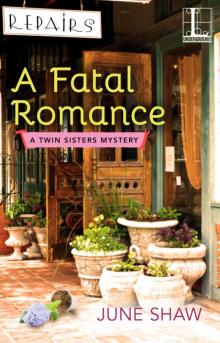 A Fatal Romance
A Fatal Romance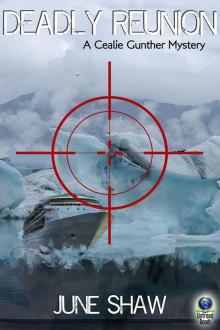 Deadly Reunion
Deadly Reunion A Manor of Murder
A Manor of Murder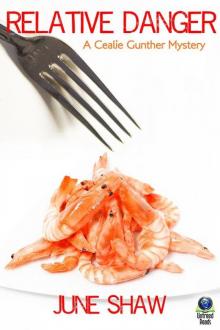 Relative Danger
Relative Danger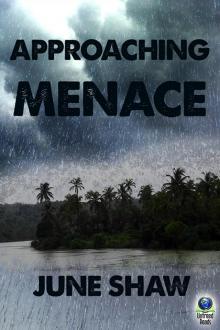 Approaching Menace
Approaching Menace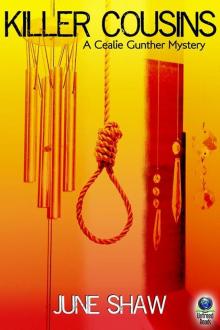 Killer Cousins
Killer Cousins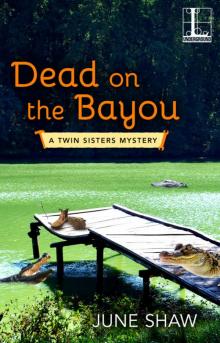 Dead On the Bayou
Dead On the Bayou